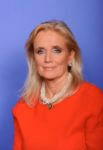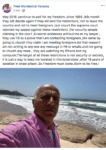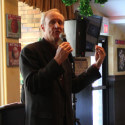“Ramy” cable series melds Arab world reality with every day American life
By Ray Hanania
As a Palestinian writer in America, my lifelong ambition is to write a TV series that portrays Arabs to Americans as being “no different” than other Americans.
If I were to script that show someday, I would call it “Everybody Loves Abdullah,” the story of a Palestinian Christian married to a Jewish wife who adopt a Muslim child embracing all three religions in one household and navigating the complexities of America’s rich diversity.
It wouldn’t be an argument about politics or the Middle East, but rather a narrative that shatters Western stereotypes to see the real “us.”
Arabs and Muslims are no different than Americans. We’re all the same, sharing the same values. We are proud to be American and proud of our cultural heritage, too.

Yet, we are not always seen that way. Our image is tarnished by one-sided news reports that portray as “terrorists” and “extremists” who are anti-West. Americans see us as being “different,” as “strangers.” No wonder Americans fear us and blame us for everything bad that happens, never giving us credit for what is good.
Not surprising is that those perceptions are being changed by hit Hulu streaming series called “Ramy,” written by comedian Ramy Youssef.
In its third season, Ramy tells the story of an American Muslim, Ramy Hassan (played by Youssef). He lives with his family in New Jersey. His father, Farouk, (Amr Waked) is Egyptian. His mother, Maysa, (Hiam Abbass) is Palestinian. Other characters include a sister, Dena, (May Calamawy), an uncle Naseem (Laith Nakli), and two good friends, Mo (comedian Mohammed Amer) and Ahmed (Dave Merheje).
The story line is realistic. The show doesn’t veil what many Arabs and Muslims call “the dirty laundry.” By offering a sanitized and unrealistic image of who we are as Arabs and Muslims, we think Americans will understand us, like us, and support our causes, like Palestine.
But the opposite happens. Americans sense a dishonesty and become suspicious of us.
Instead of educating Americans on who we really are, we tend to lecture Americans and mostly in the context of politics. We want to argue the Middle East conflict first, before even trying to become “friends.”
We try to cross the barrier of American anti-Arab and anti-Muslim perceptions in the wrong way. Instead of conveying how we really are, we paint a picture of what we think we should be. Religious. Pious. Nothing bad. Everything good. And oftentimes, it’s always in the context of Middle East politics.
Arguing the politics of our reality doesn’t work very well. Building our credibility with an audience is more effective. Doing so with humor, and honesty, is one of the best ways to build up credibility in the West.
Ramy contains much that we might not like, but it shows a reality driven by humor and comedy that opens American and Western minds.
The sexual aspects portrayed in Ramy are frowned upon in the Arab and Muslim worlds but in the West, they depict reality.
When Ramy travels to Egypt to embrace the richness of his culture, he finds that his Egyptian relatives all strive to be like Americans. They watch American TV, want the things Americans have, and pay less attention to their culture.
Ramy marries the daughter of an African American Muslim Imam from his local mosque, but the marriage breaks up when he discloses to his new bride that he had a sexual relationship with his Egyptian cousin, who attended the wedding, the day before the wedding.
When he goes to Palestine, Ramy doesn’t make a political statement so much about Israel’s brutality but instead focuses on the craziness of life there.
Critics are angry that Ramy isn’t more militant in depicting Israeli atrocities against Palestinians.
As a result, Ramy is very popular with Americans but not so popular with Arabs or Muslims. The show is a hit in America and in the West, ranking at 96.2 percent in the comedy genre, according to rating agencies, and in the top 8.6 percent of most popular shows. Ramy is not ranking well in the Arab or Muslim world.
Getting Americans to like and support our culture is not about brainwashing audiences with heavy political propaganda. “Palestine is Good. Israel is Bad!”
Americans tend to look down on those cultures that claim they are “better” or more “moral.”
It is about being somewhat self-deprecating, showing audiences that you are like them on every level, the good, the bad and the ugly. Americans and the West as a whole embrace those people who are honest about themselves, and tend to be suspicious and dubious about those who push to hard to convince you that they are better.
Ramy’s success isn’t that it tries to convince Arab and Muslim audiences our beliefs are “better.” Its success comes from the fact the series isn’t afraid to present the honesty of our culture, the good, the bad, the truth.
In that honesty, Americans find a sympathetic appeal that softens their bigotry and strengthens their understanding of who we are. That makes it easier to understand the reality of the injustices our people face.
Ramy has angered many Arabs and Muslims. But Ramy’s compelling storyline forces Americans and the West to better understand Islam, as a religion, and to see Arabs as real people.
Sometimes having “bad” makes it easier to see the “good.” In that meld of good and bad, Ramy excels at winning the hearts and minds of Americans and the West.
And if you want more of Ramy, you might enjoy the spin-off that Netflix launched featuring Mohammed “Mo” Amr called “Mo,” a similar comedy series that speaks to the truth of our lives. This spin-off series is phenomenal and like Ramy, Mo is must watch, too.


- Israelisnipers shooting and killing hospital workers in Gaza - December 11, 2023
- CAIR Condemns Israeli Executions of Wounded, Unarmed Palestinian in West Bank - December 11, 2023
- Arab and Muslim American voters face a “simple choice” between Biden’s inhumanity and Trump’s edgy politics - December 9, 2023

























Comment on ““Ramy” cable series melds Arab world reality with every day American life”